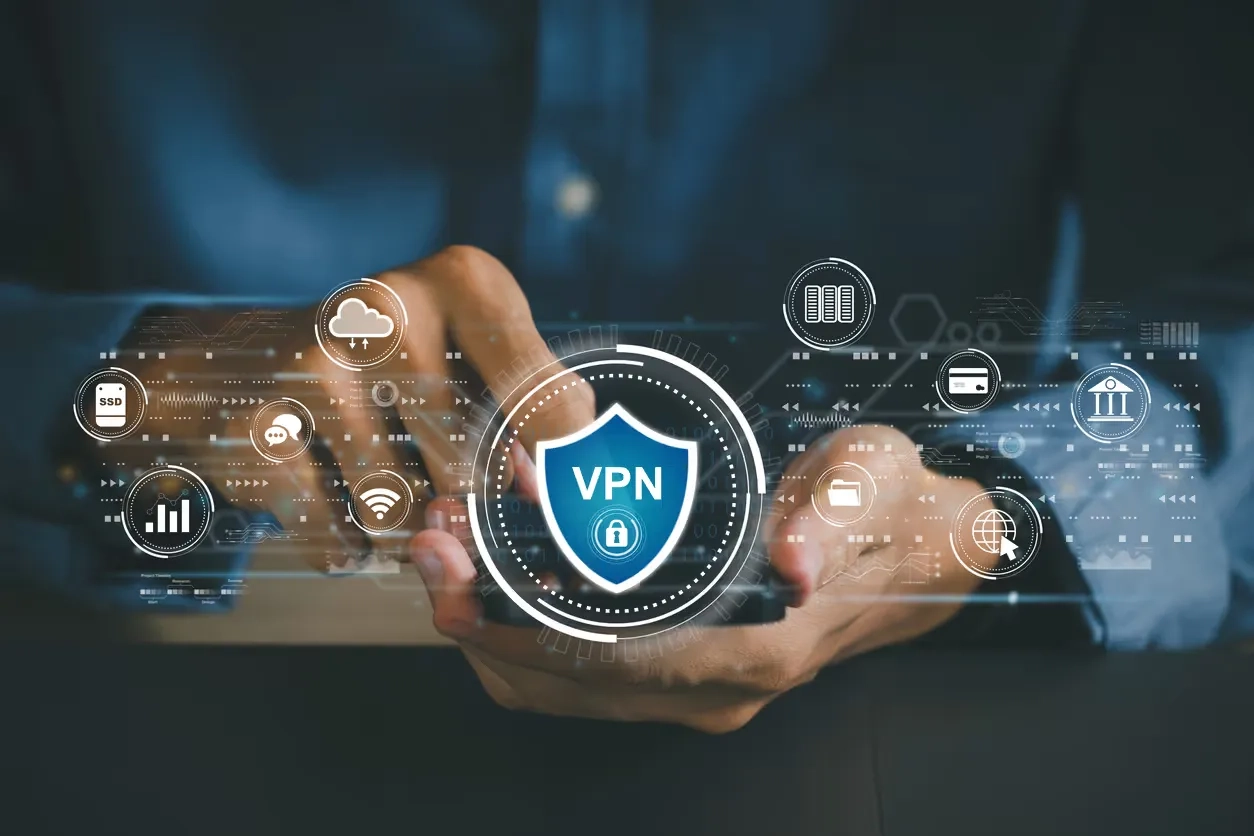In recent years, the landscape of immigration law practice has undergone significant changes. With more firms embracing remote work and employing staff who may work from various locations – sometimes even abroad – the need for secure and flexible access to sensitive information has never been greater. This shift brings new challenges, particularly in maintaining data security and ensuring access to region-specific resources. Enter the Virtual Private Network (VPN), a tool that's becoming increasingly crucial for modern immigration law firms.
In this article, we’ll learn what a VPN is, how to choose the right VPN for your law firm, and why VPN use is so important.
What is a VPN?
A Virtual Private Network (VPN) is an indispensable tool for legal professionals, especially in the high-stakes field of immigration law. VPNs create a secure, encrypted connection between your device and the internet, functioning as a protective tunnel that conceals your online activities from unauthorized observers. By making it appear as if you are accessing the internet from a different location, a VPN ensures that your digital footprint is virtually untraceable, thereby safeguarding the privacy and confidentiality of your communications and data.
Key features of VPN technology are particularly relevant to the legal profession. VPNs encrypt your internet traffic, making it unreadable to potential interceptors, which protects sensitive client information during transmission. Additionally, by masking your IP address and replacing it with one from their own servers, VPNs enhance privacy and prevent location tracking. This capability is especially beneficial when dealing with geographically diverse clients and jurisdictions. VPNs also offer secure remote access to private networks, allowing legal staff to connect to the firm's resources safely from any location worldwide.
Five benefits of VPNs for immigration law firms
For immigration law firms, the benefits of using a VPN are numerous and significant.
Enhanced security is perhaps the most critical benefit.
VPNs provide an extra layer of protection for sensitive client data, which is crucial in an industry where confidentiality is paramount. By encrypting all internet traffic, VPNs ensure that client information remains secure, even if intercepted.
Secure remote access is another key advantage.
With a VPN, staff can safely access firm resources from anywhere, whether working from home or traveling. This flexibility is invaluable in today's increasingly mobile work environment, allowing lawyers and staff to remain productive regardless of their location.
VPNs also enable firms to bypass geographical restrictions.
This capability allows access to region-locked content or services, which can be essential when dealing with international immigration cases. For instance, a lawyer in the U.S. might need to access resources that are only available in the client's home country.
Protection on public Wi-Fi networks is another crucial benefit.
When lawyers or staff need to work on the go, perhaps at a courthouse or while traveling, VPNs secure their connection on potentially risky public networks. This protection prevents hackers from intercepting sensitive data transmitted over these unsecured networks.
Lastly, maintaining compliance with data protection regulations.
Using a VPN can help maintain compliance with data protection regulations by ensuring secure data transmission. As data privacy laws become increasingly stringent, this feature helps firms avoid potential legal issues related to data breaches or unauthorized access.
How immigration law firms can use a VPN
VPNs are essential in immigration law, enhancing operational efficiency and data security by supporting remote employees, enabling secure access for traveling lawyers, and protecting client confidentiality, all while facilitating comprehensive legal research across jurisdictions.
For remote employees, a VPN is essential. Staff working from home can securely access case files and firm databases just as they would in the office. This seamless access ensures that work continues efficiently, regardless of physical location.
Traveling lawyers also reap significant benefits from VPNs. Attorneys can safely connect to firm resources while at courthouses, USCIS offices, or when traveling internationally to meet clients. This secure connection ensures they have access to all necessary documents and information, enhancing their ability to serve clients.
Accessing region-specific content is another key use case. VPNs enable firms to view websites or access services that might be restricted in certain countries. This capability is particularly useful when dealing with international clients or cases involving multiple jurisdictions, providing a critical edge in legal research and strategy.
And of course protecting client communications, especially in countries with strict internet surveillance. VPNs help maintain client confidentiality by encrypting all communications, ensuring that sensitive discussions remain private and secure. This level of protection is essential for maintaining the trust and confidentiality between attorneys and their clients.
How to choose the right VPN
When selecting a VPN for your immigration law firm, several critical factors must be considered.
Strong encryption protocols are crucial for the highest level of data security. Choose VPNs that use advanced encryption standards to diligently protect your firm’s and clients’ information.
A “no-logs” policy is another crucial feature for maintaining privacy. Select a VPN provider that does not keep records of your online activities, thereby ensuring that your firm’s work remains confidential and secure.
Server locations in relevant countries are also important for accessing region-specific content. Make sure the VPN you choose has servers in locations pertinent to your firm’s operations. Ease of use for non-technical staff is vital for successful implementation. The VPN should be user-friendly, featuring intuitive interfaces and simple connection processes so that all staff members can use it effectively without technical difficulties.
Lastly, scalability is important to accommodate firm growth. Choose a VPN solution that can easily add new users and devices as your firm expands, ensuring that your security measures can grow alongside your business.
Strategies for integrating VPN usage in your firm
To successfully integrate VPN usage into your firm, it's essential to provide comprehensive training to all staff members. This training should cover how to connect to the VPN, when it should be used, and best practices for maintaining security. By ensuring everyone understands the VPN’s role and functionality, you can promote seamless and secure usage across your team.
Establishing clear policies on VPN usage is also crucial. Outline situations where VPN use is mandatory and provide guidelines for secure practices. These policies will help standardize procedures and ensure that all staff members are aware of their responsibilities in maintaining security.
Regularly updating and maintaining the VPN, along with other security measures, is vital for ongoing protection. Keep the VPN software up-to-date and continuously review and adjust your security protocols to address new threats and vulnerabilities, ensuring your firm's data remains secure.
Docketwise immigration law firm CRM and case management
As immigration law firms adapt to a more distributed and digital work environment, VPNs have become a necessity rather than a luxury. Implementing a robust VPN solution ensures security, maintains compliance, and provides staff with the flexibility to work effectively from anywhere. This is crucial for safeguarding client information and ensuring seamless, secure operations.
At Docketwise, we understand the importance of secure and flexible work practices in immigration law. As a dedicated immigration case management, immigration forms management, and CRM platform tailored to the diverse needs of immigration law firms of all sizes and practice areas, Docketwise gives attorneys the tools they need to deliver best-in-class services.
If you’re new to Docketwise and would like to try and see if it’s a good fit for your firm, schedule a demo on our website today.
And check-out the official Docketwise podcast, "Immigration Uncovered," and don't forget to subscribe to "Immigration Insights," a quick five-minute newsletter that keeps thousands of immigration lawyers informed and up-to-date!
Carve Your Niche in Immigration Law
Unlock the potential of your personal brand and set yourself apart in the world of immigration law. Harness the tools, strategies, and insights to become the go-to expert in the immigration law landscape.
Download Now
About the author

James PittmanAttorney & Co-FounderDocketwise
James Pittman is co-founder of Docketwise and was previously engaged in the private practice of US Immigration Law. He also regularly teaches Continuing Legal Education (CLE) classes on immigration law topics and legal ethics. He is admitted to practice in New York and New Jersey and is a graduate of Northeastern University School of Law.
